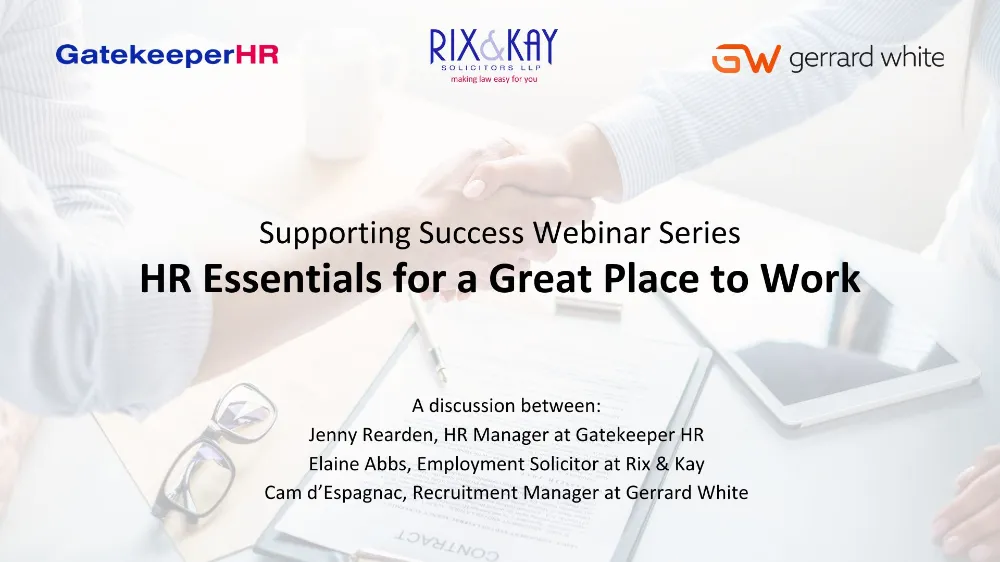Specialist Legal recruitment expert Cam d'Espagnac teamed up with Jenny Reardon, Head of GatekeeperHR and HR Consultant and Elaine Abbs, Employment Solicitor from Rix & Kay to deliver the first in a series of Supporting Success webinars. Designed for HR teams and Senior Executives, our first event covered topics including:
Employee Attraction & Retention
Salary & Pay Strategies
Workplace Wellbeing

Below is a summary of the webinar.
Employee Attraction & Retention:
Attracting and retaining employees is crucial for businesses due to the significant impact on costs and overall business growth.
Strategies for recruitment and retention should be aligned with business goals and involve considerations such as competitive salaries, benefits, flexible working arrangements, and career development opportunities.
Effective HR support is essential in facilitating employee development, ensuring transparent processes for performance reviews, and aligning business needs with career opportunities.
Flexible working arrangements are increasingly important for employees, and upcoming legislative changes reflect this growing trend, emphasising the need for employers to adapt to flexible work arrangements to attract and retain talent.
Salary & Pay Strategies:
Employers should conduct thorough research and analysis when carrying out salary reviews, considering market rates, competitor practices, and employee performance.
It's essential to ensure transparency and fairness in pay practices, addressing pay gaps and conducting regular audits to rectify any discrepancies.
Other than salary, employees value benefits such as pension contributions, holiday entitlement, flexible working arrangements, bonuses linked to performance, and additional perks like private medical insurance or childcare support.
Salary sacrifice schemes can be beneficial for both employers and employees, offering tax-efficient ways to provide non-cash benefits, but it's essential to understand the regulations and changes in legislation regarding such schemes.
Workplace Wellbeing:
Employers should prioritise employee well-being as it directly impacts individual performance and overall business success.
Supporting employee well-being can take various forms, including implementing employee assistance programs, offering flexible working arrangements, providing health and wellness programs, and training managers in soft skills.
Employers should regularly communicate and seek feedback from employees regarding well-being initiatives to ensure effectiveness and alignment with employee needs.
New legislation, such as carers leave, highlights the importance of accommodating employees' personal responsibilities and supporting their well-being.
To attract new staff, companies should focus on showcasing their culture and benefits through their website, partnering with recruitment agencies, managing their reputation on platforms like Glassdoor, and maintaining clear and prompt communication throughout the hiring process.
Updates
Since the filming of this webinar, some of the laws mentioned have changed, so please refer to the latest information available online.
Changes to the 6th April 2024 Flexible Working Regulations:
For clarification, since the date of the live seminar please be aware that the changes are:-
Employees are now entitled to make two flexible working requests per year (as opposed to one). A second request cannot be made until the earlier request has been concluded;
Employees are not required to specify the impact that their request may have on the business and how those effects may be dealt with;
Employers must respond to flexible working requests within two months as opposed to three months (this time limit is inclusive of any potential appeal process); and
Employers must not reject a flexible working request without first consulting with the employee.
As a reminder, the eight statutory reasons to refuse a request are unchanged.
For more information about the content of this webinar please contact Cam on cam@gerrardwhite.com














